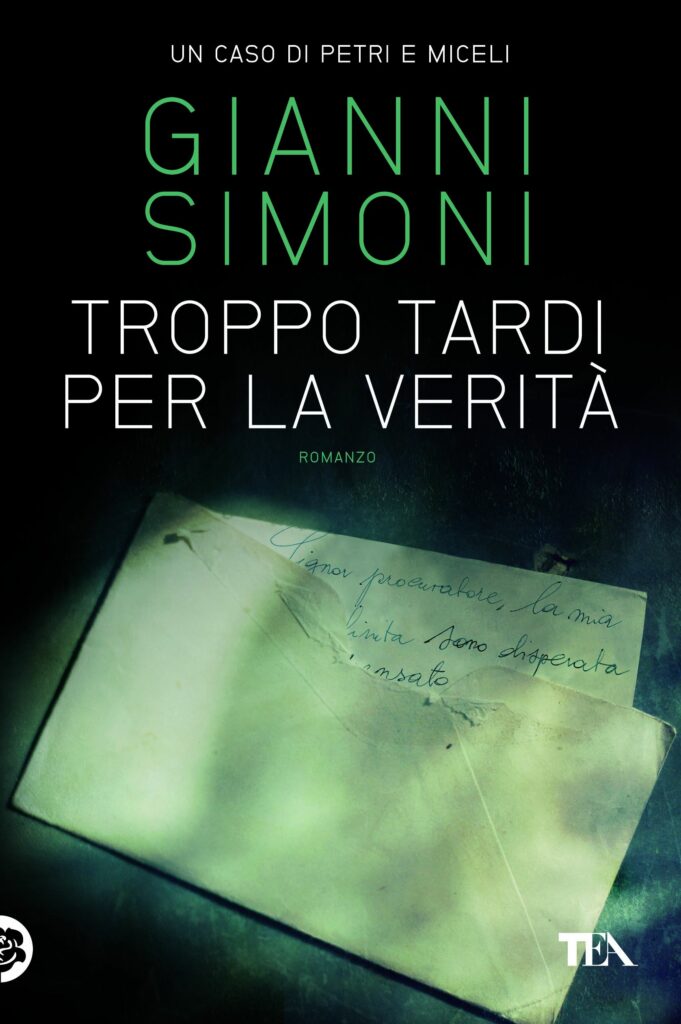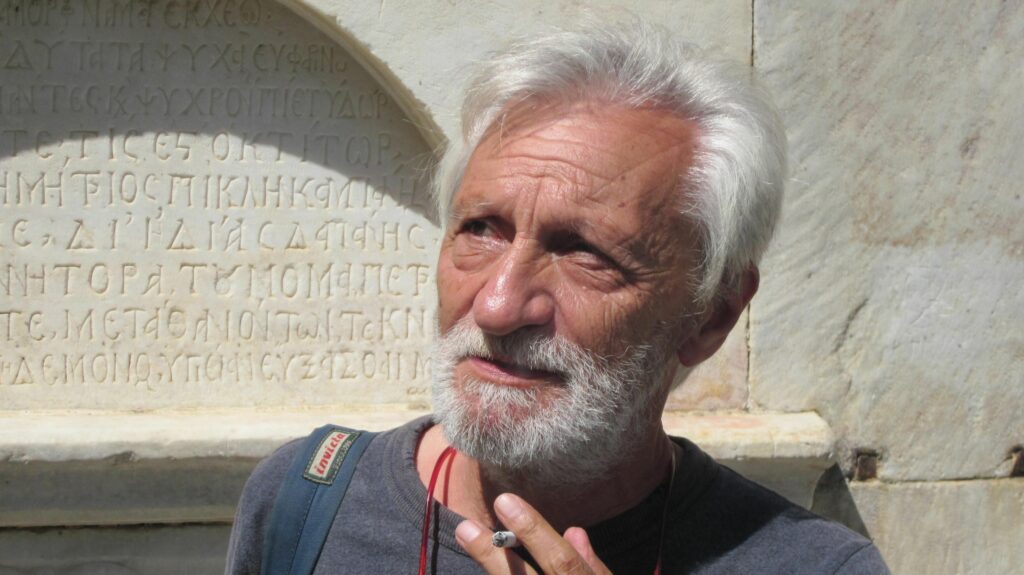

One year ago, I embarked on this adventure: the creation of my blog with the intention to reach most possible readers. For that, I ‘ve realized it was important to write in few languages. I was lucky to have, from the beginning and after few months, invaluable helps: I thank you my cousin Elisabeth who corrects my english mistakes and Christian, a young friend, a computing student who allows me to improve the appearance of my blog and Paolo my adorable partner, about the content in the article of truffle hound. I ask you to be patient because I had to move my previous articles, that you will find and read again then.
But you are thinking, impatient, who is the special guest ?
So the special guest is a wonderful italian detective stories: Gianni Simoni who I ‘ve interviewed especially for you.
You will find my introduction to the writer, then the interview.
From the Langhe to Brescia, to the discovery of the future « Simenon ».
Before moving to this beautiful region, I used to commute between Padoua and Torino for over a year. One day, as I was traveling from Padoua to Torino, I bought a magazine in which I read a book review, about a novel entitled « Piazza San Sepolcro » by Gianni Simoni. I was intrigued: I had just discovered a writer who, in my opinion, could become the respectable Italian successor of the great George Simenon. I might not be the first one to associate the two authors.
While waiting for my connection that same day, I came across the Feltrinelli bookstore open until 10.00 pm.I decided to buy the book I had just read about.
After reading the first pages, I was immediately hooked and captivated. On the book cover, I discovered this wasn’t’ his first story. However, it was the first of a series of stories from the Police Inspector Lucchesi.
Ever since, I’ve read almost all his books. I’ve been even more impressed by the Petri and Miceli series. When I discovered the character Petri, a retired judge, just like the writer, I thought those stories were autobiographical. My intuition was confirmed after meeting him for an interview. However, in the Inspector Lucchesi series, I was surprised by the choice of a black man for an inspector. I thought it was an unusual choice for a writer who was born and raised in Italy. Compared to France, Italy has had a later immigration and suffers from more racial prejudices.
In his books, Gianni Simoni, actually writes.
I think his writing is a perfect cocktail: his characters form a cohesive team of protagonists, who seduce, intrigue, amuse and interest the reader from the first to the last page.
In addition, this writer is very astute, he has a talent to for keeping the suspense until the end of the investigation. When you finish the book, you feel disappointed not because of the ending but because the book is finished. The impression I have every time I finish one of his books could be summarized by this quote from Paul Sweeney: « You know you’ve read a good book when you turn the last page and feel a little as if you have lost a friend ».
Gianni Simoni knows how to mix investigation, sense of humor and seduction. Just like a woman wearing a long open dress, he suggests but does not reveal.
Gianni Simoni books have already been read and appreciated outside France, my mother and my uncle who can read Italian without difficulties have also enjoyed reading his stories . My mum and I are addicted to his books and we are always waiting the next release. I speak about him with enthusiasm, especially to people who enjoy reading.
But I am sure that if they were translated, they could be very successful.
This could probably lead to international fame, just like Simenon.
I am proud to have interviewed the great Gianni Simoni, here you are.
1) Did you decide to write when you retired or has it always been a dream something you have always wanted to do?
The desire to write appeared when I decided to leave my job as a judge. Before that time, writing was a desire I had but I did not have the time to do it.
2) Who are your favorite crime novels authors?
I really enjoy reading books a second time. I rarely read crime novels I read them when I travel by train and realize I forgot to bring my book. This kind of book will make my journey shorter and I can leave it in the train without any guilt. However, there are exceptions: the great Simenon who cannot be simply reduced to writing crime novels, Ed Mc Bain, the American writer with Italian origins. Author of 87 district. I like Simenon for the quality of his writing and for the atmosphere he creates even in this type of book. Ed Mc Bain for the rhythm of his novels, for the way he combines the different events for the characters whose personality he can describe so clearly.
3) Do you inspire yourself from your professional life. Is there something or someone who inspires you such as a trip or a city?
My professional life has been a great source of inspiration. I only use some starting points then I develop a story.
In case memories are not enough, then imagination takes over and before that everyday life which only needs to be “read” and used. Here is an example for everyone: one morning last year, like Petri who is an autobiographical character, I had gone out to buy cigarettes and the newspaper, to get coffee in the only bar. As I was lighting a cigarette, the first of the day (the best one), a person got off the sidewalk to cross the street and got hit by a car. Fortunately he was not hit badly, but the car did not stop. 3 people witnessed the incident, a middle age couple and an old man. As I was calling the ambulance, they commented on the incident and gave me the impression they had not witnessed the same accident. This is not unusual, however, it intrigued me. Back home, I sat down in front of my computer and started to write. This is how “Troppo tardi per la Verità” (Too late for the truth) was born, the latest novel in the Petri-Miceli series.
4) Which advice would you give to an inspiring crime novel author?
I do not think I am in the position to give any advice to anyone who wants to write this kind of books. I can only suggest a few things: never stop reading (reading is the mother of writing), follow the news and keep your eyes open to observe the world around you and see if appearances sometimes hide a different reality.
5) Have you already thought about writing for the theater? Would you like for one of your novels to be adapted for theater?
Writing a text for a play should not be too difficult for me since my novels are full of dialogues. But theater has a limit: the almost impossible task of re-creating the urban reality in which my stories take place. In this case, the cinema and the television industry and a movie production company have already bought the rights for a potential TV series of Petri and Miceli. But it is only a possibility at this point and I do not know where it is going to go.
6) In your career as a judge, did it happen to you just as it does to judge Petri, to ask your wife her point of view?
Judge Petri, just like his author, is retired and when he collaborates with the police he does it in an informal way so he can talk about investigations with his wife who he trusts and whose opinion he wants to hear. But as I said, Petri is retired. When I was a judge, confidentiality prevented me from talking about investigations to anyone including my wife.
7) Do you know the Langhe region? If it were possible, would you like to come there to present your last novel?
Of course I know the Langhe region, it is such a fascinating region that authors like Pavese have written about it. I doubt I will come there. Anyway, my publishing house does not look for invitations, it receives them and then sends them to me to see if I am interested.